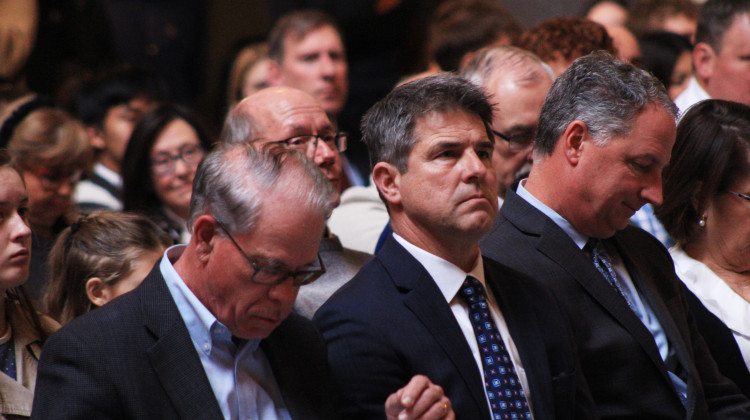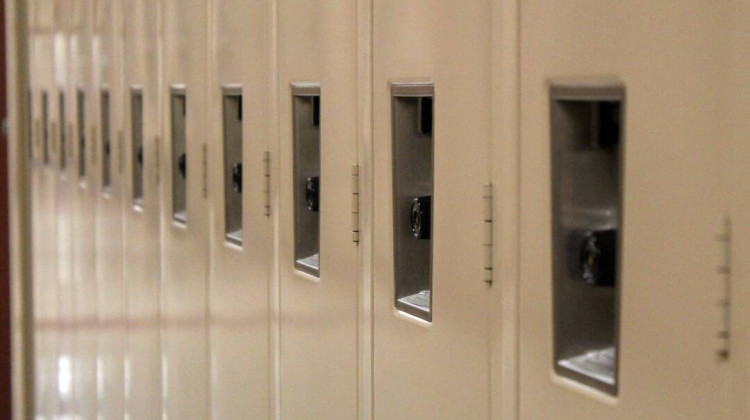
A packed room for a meeting of the Indianapolis Public Schools Board of Commissioners in January 2020.
Eric Weddle/WFYI NewsVirus Precautions Led Indianapolis Public Schools Board To 'Technically' Break Open Door Law, Says Counselor
Indiana’s public meeting and records access laws are temporarily altered for two weeks, part of Gov. Eric Holcomb’s steps to slow the spread of the coronavirus.
The executive order, issued Monday, expands changes made earlier this month to the Open Door Law. As agencies moved to respond to the pandemic and follow new guidance, a few ran afoul of the law, including the state's largest school district, Indianapolis Public Schools, who blocked the public from attending a meeting.
Holcomb’s directive, and a related guidance document does require all public agencies and governing bodies to limit meetings to those essential for operations and for issues that relate to health, safety and response to the coronavirus.
If a meeting is held, the board does not have to meet in person instead of a required minimum number of board members at a publicized location. The board can conduct the meeting electronically, such as in a phone or video conference, and the public and media must be provided access to it in real time.
Luke Britt, Indiana's Public Access Counselor, says government bodies should table non-essential topics until after the order ends April 7.
“Especially if it has longterm, binding impacts. So any kind of additional levies or accumulated funds or ordinances that have nothing to do with what we're facing right now,” he says. “That needs to be set aside until the public can come and have that discussed in person, like they normally would.”
Britt says councils, hospitals and other bodies that need to approve decisions to immediately address safety and operations can meet.
“They only meet if they have to for essential operations,” Britt says, expounding on the order. “Anything that's critical to the operations of, of government, any essential functions such as public safety, EMS, fire safety, and those kind of things. Any meeting that will need to be convened to address the (coronavirus) emergency itself would be essential.”
Britt says the governor’s office sought input from him and statewide associations across sectors to make the changes.
“Obviously we want to be diplomatic and as cautiously balanced as we can. It's not necessarily public safety versus public access,” Britt says. “But how we can come to a decision that's best for both of those perspectives.”
The order also limits access to public records. It suspends parts of the Access to Public Records Act (APRA), through April 7. The public can not request a public record in person or by phone, and it postpones the policy that deems a public record request denied if the agency does not acknowledge it within seven days.
The public and media can still file a document request through the mail, email, or fax. Agencies are required to acknowledge receipt of a request during this period “in reasonable time” after April 7.
READ: FAQ Regarding COVID-19 And Indiana’s Public Access Laws
Watchdog and news associations say they understand the need for the temporary changes as the state and country grapple with the pandemic. Steve Key, Hoosier State Press Association executive director and general counsel, says the order is straightforward and strikes a balance to address the need for transparency and public safety.
Yet, Key says agencies must not take advantage of suspended provisions.
“My concern would not necessarily be with the order, but the application of the order when it gets down to the local level,” he says.
Key says there is already worry some hospitals may not respond to public record requests for simple questions, like the number of beds, in a timely manner because of the changes to the record access law.
“That's only going to cause the public to be a little bit more distrustful of the preparations. Or, you know, panic a little bit because they don't think that their county is going to be prepared,” Key says, “It would be unfortunate if it was all based on the fact that these hospitals just are failing to respond to basic questions.”
Indianapolis Public Schools ‘Technically’ Break Open Door Law
Key says the new guidance issued by the Public Access Counselor clarifies the governor’s previous executive order on March 16 that limited the public attendance to no more than 50 persons. That order led to some boards holding executive sessions without public notice and Indianapolis Public Schools Board of Commissioners blocking the public from attending a board meeting.
Last week, the school district announced only 10 people could be in the boardroom for its March 19 action session, including board members and the media, but the public could not attend. A Facebook Live video of the meeting was available. A new electronic portal would also allow the public to submit comments up until two hours before the meeting began.
Recent IPS Board meetings attracted standing-room only crowds, as the public and board debated recommendations to restart two schools and a decision to outsource all transportation services with a private company. The final action in the restart debate was scheduled for the March 19 meeting, three days after Holcomb's restrictions were announced. Between the time of the executive order and the meeting, the Centers for Disease Control also changed its recommendation, to limit gatherings of 50 people to only 10 people.
District leaders said the decision to announce the public could not attend was based on guidance from state and local public health officials to limit the size of gatherings.
Britt, the state’s public access counselor, says he understands the IPS board was trying to follow safety guidance, but they didn’t do what is required by law.
“It's tough for me in these unusual times, to put that kind of label on it, whether they broke the law, whether they're in violation of the law,” Britt says. “The law that was in place wasn't technically followed. I'll say that. I think their reasoning was to protect public safety. And I can't necessarily fault them for that, but at the same time, you know, the law is what it is.”
Earlier in the week, the Indianapolis City-County Council allowed a limited number of public to attend its meeting by submitting a request in advance. Persons and council members were spaced apart in the boardroom.
Britt says that is the guidance he gave to IPS and other public agencies last week.
“My guidance was the same as with any other school corporation or governing body in the state,” Britt says. “That they could limit capacity in their seating area to safe distances. But the public could not be excluded all together.”
Indianapolis City-County Councillor Dan Boots, submitted to IPS a letter signed by 11 other councilors that criticized the the school board’s move to block public attendance.
Michael O’Connor, IPS board president said in a statement that he does not believe the board broke the law, as it followed various health recommendations for public gatherings to not exceed 10 people.
“As we received continual updates on the growing public health crisis and discussed how we should respond as a governing body, I modified our public meeting protocols to align with the recommendations of the Indiana Governor, The Center for Disease Control and Prevention, the Indianapolis Office of Corporation Counsel and public health officials about how best to limit the potential for community transmission of coronavirus,” O’Connor said. “We streamlined our agenda to only urgent and essential items and made efforts to conduct an efficient meeting while limiting person-to-person contact.”
On the day of the meeting, O’Connor said, IPS staff were directed to allow up to 10 members of the public at the meeting, in addition to the 10 spots previously announced. This information was not publicized. No one from the public attempted to attend the meeting.
“I believe these accommodations were reasonable and necessary, and aligned to the letter and spirit of local, state, and national guidance on how public agencies should respond to the increasing threat to the health and safety of our community,” O’Connor said.
Britt says he’s aware of IPS’ last-minute attempt to allow the public to watch the meeting in person but it was a moot effort since the district and media publicized the public could not attend.
The March 19 meeting was held with O’Connor and three other commissioners attending in person. Three commissioners attended via phone. More than 140 public comments were submitted electronically. The board adopted its budget appropriations for the 2020-21 school year and narrowly approved the restart of two elementary schools in seperate 4-3 votes, among other items.
All of the actions taken by the IPS Board at the meeting remain in effect. Britt says the board's actions could be challenged if he issued an opinion that the board violated the Open Door Law and executive order. That would expose the school board to a potential lawsuit.
Contact WFYI education reporter Eric Weddle at eweddle@wfyi.org or call (317) 614-0470. Follow on Twitter: @ericweddle.
This is a rapidly evolving story, and we are working hard to bring you the most up-to-date information. However, we recommend checking the websites of the Centers for Disease Control and Prevention or the Indiana State Department of Health for the most recent numbers of COVID-19 cases.
 DONATE
DONATE






 Support WFYI. We can't do it without you.
Support WFYI. We can't do it without you.